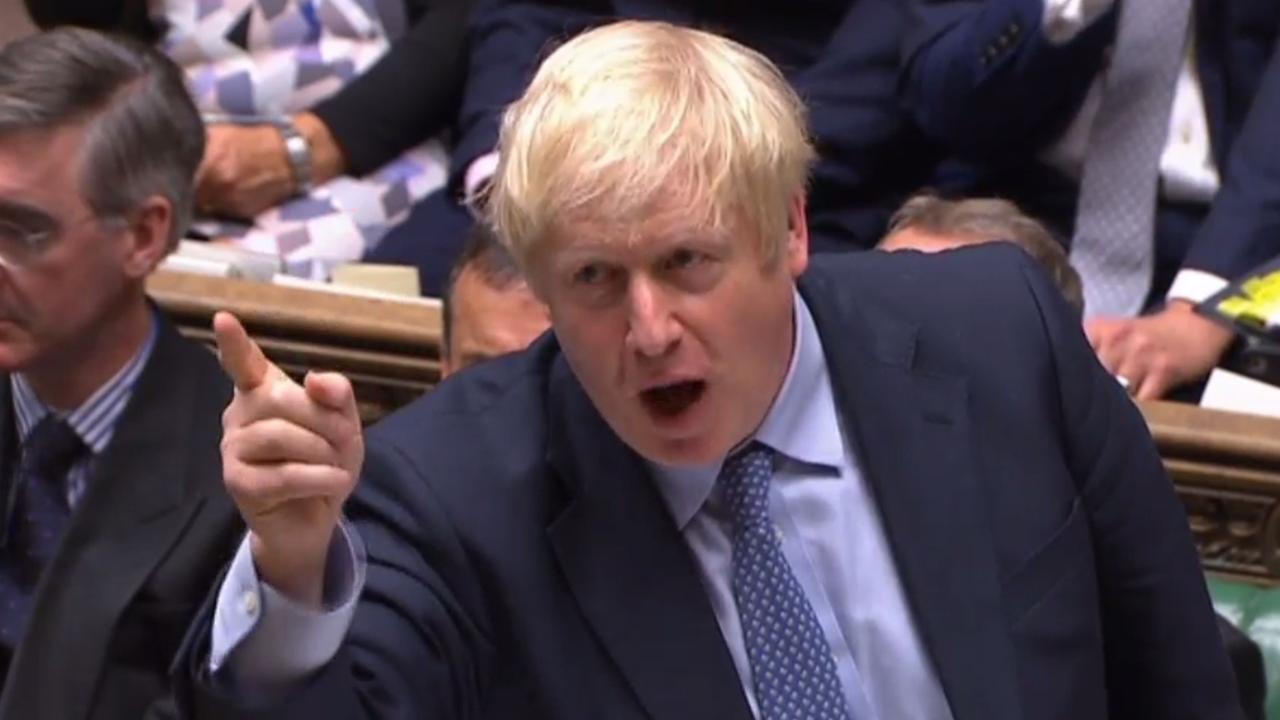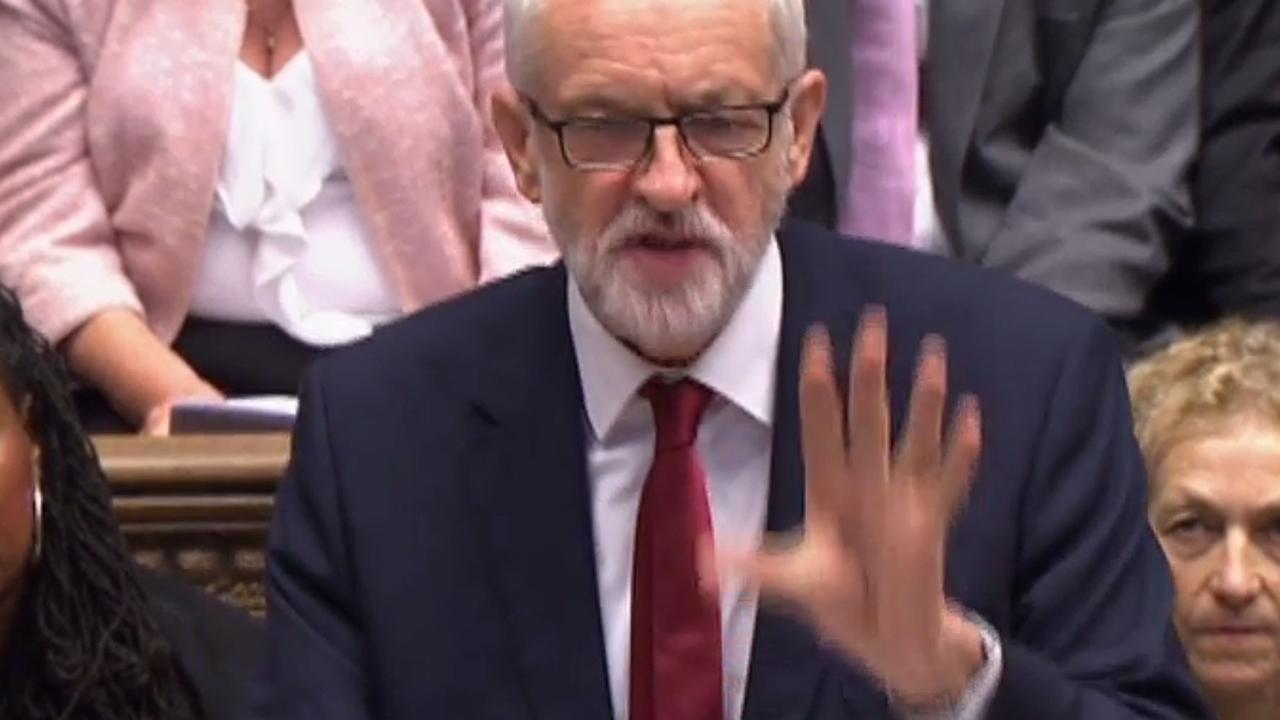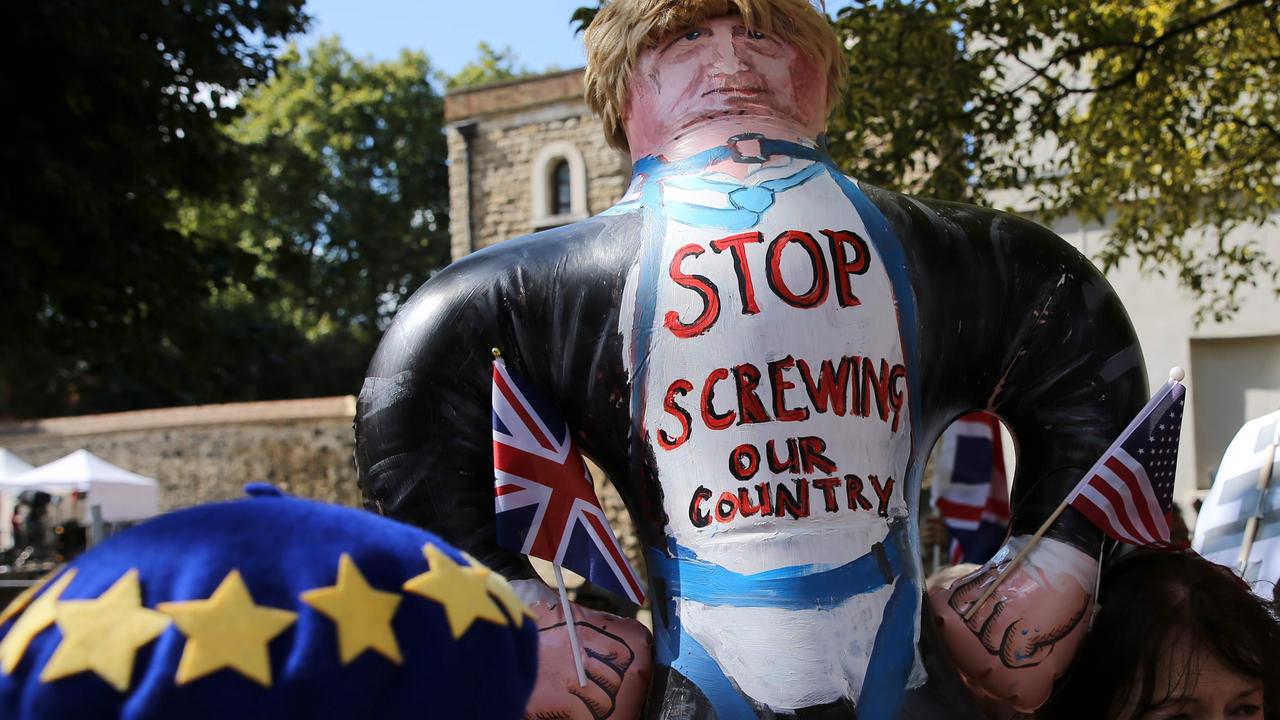UK MPs block no-deal Brexit and PM Boris Johnson’s snap election demand
British Prime Minister Boris Johnson has suffered another stunning defeat in parliament, with his plan for a snap election left in tatters.
Britain’s House of Commons has been blasted as a “zombie parliament” after it both voted for a new law that would demand the country rule out a no deal exit from the European Union and denied UK Prime Minister Boris Johnson’s request for a snap election to break the Brexit deadlock.
Mr Johnson has previously said that Britain will leave the EU “no ifs and no buts” on October 31, with or without a deal.
The new Prime Minister, who has been in office for just weeks, has now suffered three Commons defeats in just two days.
Mr Johnson demanded politicians back his call for a snap election on October 15, after the Commons earlier moved to stop him leading the country out of the EU without a deal.
That vote, passed by 327 votes to 299, said Mr Johnson should rule out no deal and ink a Brexit agreement with the EU by October 31 or extend the leave date, probably into 2020.
Mr Johnson said “there is only one way forward for the country” — a vote to determine who should govern.”

While Mr Johnson’s motion for an election was passed 298-56 this morning, it needed 434 MPs to vote yes - two thirds of members - for it to be passed.
Labour MPs abstained from the vote because they wanted a guarantee the UK will not crash out of the EU without a deal before backing an election.
Mr Johnson slammed Labour leader Jeremy Corbyn after the vote.
“I think he has become the first leader of the opposition in the democratic history of our country to refuse the invitation to an election,” he said.
“I can only speculate as to the reasons behind his hesitation. The obvious conclusion I’m afraid is he does not think he will win.”
MORE: How did Britain get into this mess? Brexit explained.
He later laid into Mr Corbyn on the ITV network: “To be so subsumed by cowardice is not politically sustainable.”
Mr Corbyn hit back and said the PM was “playing a disingenuous game” to force a no deal Brexit.
The result leaves Mr Johnson in a bind. He is now legally obligated to either seek a deal with the EU over Brexit or extend the deadline for leaving the EU beyond October if he cannot reach a deal. Yet he became PM with a promise to do neither.
Senior Conservative MP Sir Bernard Jenkins said in the Commons that Westminster was now a “zombie parliament”.
He said the 2016 referendum result, where Brits voted to leave the EU by a margin of 4 per cent, needed to be honoured and extending the leave date for a third time might make little difference.
“What is going to be gained in putting off the decision again?
“There’s a definition of madness: to repeat the same decision again and again and expect a different outcome.”

HOW DID WE GET HERE?
Mr Johnson wants to take Britain out of the EU with or without a divorce deal on October 31. Being serious about a no deal Brexit is seen as key by Mr Johnson to being able to persuade the EU to come back to the negotiating table and alter some of the contentious parts of a previous agreement struck with his predecessor Theresa May, particularly the so-called Northern Irish “backstop”.
But rebel Conservatives and opposition MPs yesterday seized control of parliament.
Today, MPs passed a bill that will force the PM to seek a three-month Brexit extension from Brussels if no deal emerges from an EU summit scheduled for October 17-19.
Mr Johnson would rather go to an election than follow through on this demand.

SO WHAT HAPPENS NOW?
What next? The last 48 hours in British politics have left Mr Johnson without a majority but unable to call an election and with his Brexit strategy in tatters.
Here are some possible scenarios for the coming weeks:
Early election
Despite Wednesday’s vote, this still appears the most likely outcome. Under British law, the next election is not due until 2022 and a two-thirds parliamentary majority is required if the government want to hold a vote ahead of time.
Labour abstained on Mr Johnson’s request for a snap poll in October, saying parliament should first approve a draft law aimed at preventing a no deal Brexit.
Some Johnson opponents also do not believe his vow to hold the election on October 15 and warn he may try to delay it until after Brexit on October 31.
This may also not be a good time for an election for Labour, which is languishing in the opinion polls.
If Labour remains opposed, Mr Johnson could consider other options, such as calling a vote of no-confidence in his own government or introducing a different type of law for an election, both of which only require a simple majority.
‘No deal’ Brexit
Britain is currently scheduled to leave the EU on October 31 whether or not it has agreed a divorce deal with Brussels.
Mr Johnson insists he will not make any more requests to delay Brexit, more than three years after Britons voted to leave the bloc in June 2016.
Although he says he wants a deal, he has stepped up preparations for a “no deal” exit and critics claim he could still try to force through this scenario.
In a highly controversial move, Mr Johnson has arranged for parliament to be suspended next week until October 14 — a fortnight before Brexit.
Other possible tactics could include advising Queen Elizabeth II not to give royal assent to the rebels’ bill against his Brexit strategy, or finding an EU ally to veto any British request for an extension.
Brexit with a deal
Mr Johnson, who took power in July, wants to change the terms of the divorce deal agreed by Ms May, which was rejected three times by parliament.
His main objection to the current plan relates to proposals for keeping open the border between British Northern Ireland and EU member Ireland.
The EU insists this so-called backstop provision must stay, and says London has yet to come up with any credible alternative plan.
Mr Johnson is pinning his hopes on an October 17-18 EU summit when he believes the threat of a no deal Brexit will prompt the bloc to make compromises and allow a last-minute agreement.
Alternatively, some believe Ms May’s divorce deal — even still containing the backstop — could be presented to MPs again.
Delay to Brexit
The draft law approved by MPs — which must still receive final approval from the House of Lords — instructs the government to seek a Brexit delay until January 31, 2020, if it has not reached a deal with the EU by October 19.
Ultimately, the decision is one that must be taken by all 28 EU leaders unanimously.
But, if a delay is agreed, then the government must regularly report on its progress in negotiations, and if there is still no deal by January 31, the law implies that Brexit would have to be delayed again.
Mr Johnson has warned that the legislation could have the effect of delaying Brexit “potentially for years”.
No Brexit at all?
This prospect seems perhaps the most unlikely but cannot be entirely ruled out. Mr Corbyn has promised that, if he wins power, he will hold a second referendum with an option to remain in the European Union.



